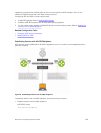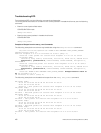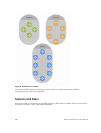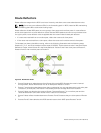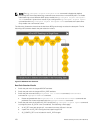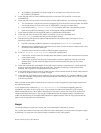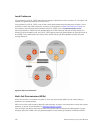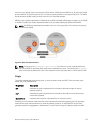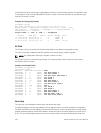Establish a Session
Information exchange between peers is driven by events and timers. The focus in BGP is on the traffic
routing policies.
In order to make decisions in its operations with other BGP peers, a BGP process uses a simple finite state
machine that consists of six states: Idle, Connect, Active, OpenSent, OpenConfirm, and Established. For
each peer-to-peer session, a BGP implementation tracks which of these six states the session is in. The
BGP protocol defines the messages that each peer should exchange in order to change the session from
one state to another.
State Description
Idle BGP initializes all resources, refuses all inbound BGP connection attempts, and
initiates a TCP connection to the peer.
Connect In this state the router waits for the TCP connection to complete, transitioning to
the OpenSent state if successful.
If that transition is not successful, BGP resets the ConnectRetry timer and
transitions to the Active state when the timer expires.
Active The router resets the ConnectRetry timer to zero and returns to the Connect state.
OpenSent After successful OpenSent transition, the router sends an Open message and waits
for one in return.
OpenConfirm After the Open message parameters are agreed between peers, the neighbor
relation is established and is in the OpenConfirm state. This is when the router
receives and checks for agreement on the parameters of open messages to
establish a session.
Established Keepalive messages are exchanged next, and after successful receipt, the router is
placed in the Established state. Keepalive messages continue to be sent at regular
periods (established by the Keepalive timer) to verify connections.
After the connection is established, the router can now send/receive Keepalive, Update, and Notification
messages to/from its peer.
Peer Groups
Peer Ggroups are neighbors grouped according to common routing policies. They enable easier system
configuration and management by allowing groups of routers to share and inherit policies.
Peer groups also aid in convergence speed. When a BGP process needs to send the same information to
a large number of peers, the BGP process needs to set up a long output queue to get that information to
all the proper peers. If the peers are members of a peer group however, the information can be sent to
one place and then passed onto the peers within the group.
Border Gateway Protocol IPv4 (BGPv4)
167



